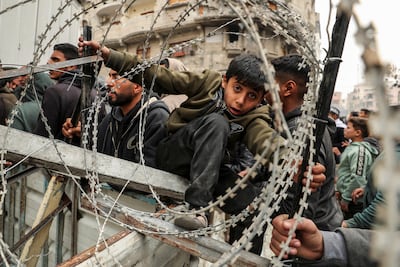Live updates: Follow the latest on Israel-Gaza
Israeli Prime Minister Benjamin Netanyahu plans to seek US President Donald Trump's backing for new conditions he wants to table in coming negotiations with Hamas, sources briefed on Mr Netanyahu's plans told The National on Monday.
The Israeli leader wants to secure Mr Trump's support when the pair meet at the White House on Tuesday, the sources said, in the first face-to-face meeting between a foreign leader and the US President since the latter's return to office last month for a second term.
The conditions include making Israel's withdrawal from Gaza and a permanent ceasefire conditional on the removal of Hamas from governing Gaza and being left out of the reconstruction effort, said the sources.
Those conditions, they explained, were rooted in the Israeli leader's often repeated assertion that the Gaza war will not end until Hamas is vanquished, and stripped of its governing and military capabilities.
Mr Netanyahu will also seek to gain the US President's support for Israel to maintain a military presence inside a narrow strip of land running the entire length of the Egypt-Gaza border on the Palestinian side, called the Salah Al Din (or Philadelphi Corridor), they said.
He also wants Israel to be directly involved in the running of the Rafah crossing between Egypt and Gaza – the enclave's only gateway not controlled by Israel – to foil any attempt to smuggle arms and dual-use material to Hamas.
News of Mr Netanyahu's plans follow Mr Trump's repeated calls on US allies Jordan and Egypt to take more Palestinians from Gaza. Both Arab nations have publicly rejected the suggestion, which caused an uproar in the Arab world. They countered by urging the US President to use his influence to pursue a two-state solution for the Palestinian-Israeli conflict, a long-time Arab demand.
"Trump and Netanyahu are trying to achieve what Israel has failed to do during its aggression on Gaza," Bassam Khalaf, a member of Hamas's political leadership, told The National. "Their main objective is to move the strip's population out and turn it into a place unfit for habitation."
However, he continued, the emergence of Hamas fighters during the ceremonies marking the handover of hostages to the International Red Cross in Gaza "constituted a message to Netanyahu that the killings and destruction of homes amounted to the failure of eradicating Hamas".

Under the ceasefire agreement, Monday is the designated day for the start of negotiations between Hamas and Israel on the second and critical phase of the deal, but the sources said the process was not expected to start until after the meeting between Mr Trump and Mr Netanyahu takes place.
The ceasefire deal that went into force on January 19 capped more than a year of indirect, on-and-off negotiations between Hamas and Israel mediated by the US, Qatar and Egypt. Both Mr Trump and his predecessor Joe Biden claimed credit for the January 15 agreement.
Under the ceasefire's first, 42-day phase, Hamas is to release a total of 33 hostages, eight of whom it says are dead, in exchange for nearly 2,000 Palestinian held in Israeli prisons. Israeli forces have pulled back from most areas and allowed hundreds of thousands of Palestinians to return to devastated northern Gaza while aid flows in.
The second phase of the deal should in theory involve the release of the remainder of hostages still held by Hamas – believed to number about 60 – Israel's full withdrawal from Gaza and a permanent ceasefire that signals the end of the war.

Hamas, which has reasserted control over Gaza since the ceasefire began last month, has said it will not release hostages in the second phase without an end to the war and a full Israeli withdrawal.
Sheikh Mohammed Al Thani, Qatar's Prime Minister and Foreign Minister, said there was no clear plan for when the talks would begin. Qatar was engaging with Israel and Hamas to prepare for the talks, he said on Sunday.
The war on Gaza, triggered by a deadly attack on southern Israel by Hamas and allied groups, has killed more than 47,400 Palestinians, according to the Gaza Health Ministry.
The conflict has also displaced the majority of Gaza's 2.3 million residents, destroyed or damaged more than 80 per cent of the enclave's homes and obliterated its infrastructure.
